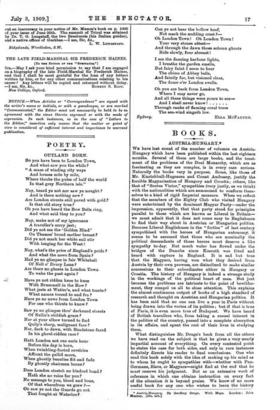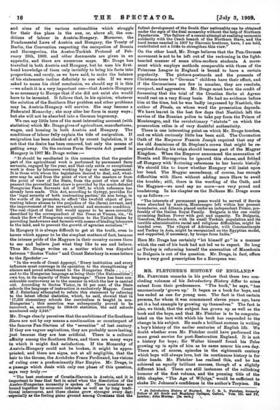BOOKS.
AUSTRIA.-HUNGARY.*
WE have lost count of the number of volumes on Austria- Hungary which have been published within the last eighteen months. Several of them are large books, and the treat- ment of the problems of the Dual Monarchy, which are as fascinating as they are complex, is in every case serious. Naturally the books vary in purpose. Some, like those of Mr. Knatchbull-Hugessen and Count Andrassy, justify the forcible Magyarisation of Hungary and Croatia; others, like that of "Scotus Viator," sympathise (very justly, as we think) with the nationalities which are summoned to conform them- selves to a kind of rigid Imperial measure. When we reflect that the members of the Eighty Club who visited Hungary were entertained by the dominant Magyar Party—under the impression, apparently, that that party stood for principles parallel to those which are known as Liberal in Britain— we must admit that it does not come easy to Englishmen to find their way about in Austrian or Hungarian politics. Because Liberal Englishmen in the " forties " of last century sympathised with the heroes of Hungarian autonomy', it seems to be assumed that those who are nominally the political descendants of those heroes must deserve a like sympathy to-day. But much water has flowed under the bridges of the Danube since Kossuth was feted and heard with rapture in England. It is sad but true that the Magyars, having won what they desired from Austria by their own prowess, are disinclined to make similar concessions to their subordinates either in Hungary or Croatia. The history of Hungary is indeed a strange study in the workings of the political heart of man. But just because the problems are intricate to the point of bewilder- ment, they compel us all to close attention. This explains the almost continuous output of books of a high standard of research and thought on Austrian and Hungarian politics. It has been said that no one can live a year in Paris without being drawn into the vortex of its politics ; but if that is true of Paris, it is even more true of Budapest. We have heard of British travellers who, from taking a casual interest in the politics of the country, passed into a complete absorption in its affairs, and spent the rest of their lives in studying them.
What distinguishes Mr. Drage's book from all the others we have read on the subject is that he gives a very nearly impartial account of everything. On every contested point he states the case for both sides, and only in rare instances definitely directs his reader to final conclusions. One who read this book solely with the idea of making up his mind as to whom he ought to sympathise with—whether with Pan- Germans, Slays, or Magyars—might find at the end that he must reserve his judgment. But as an extensive work of reference in which one obtains instruction on every fact of the situation it is beyond praise. We know of no more useful book for any one who wishes to learn the history
• Austria-I:fungal, By Geoffrey Drage. With Maps. London : John Murray. [21e. net.
and aims of the various nationalities which struggle for their due place in the sun, or, above all, the con- ditions of labour in Austria-Hungary. Moreover, the Fundamental Laws of Austria and Hungary, the Treaty of Berlin, the Convention respecting the occupation of Bosnia and Herzegovina, the Austro-Turkish Protocol of Feb- ruary 26th, 1909, and other documents are given in an appendix, and there are numerous maps. Mr. Drage has travelled in both Austria and Hungary, but he uses his first- hand knowledge of them only invisibly to bring his facts into proportion, and rarely, as we have said, to make the balance of his statements incline definitely to one side. If we were asked to name his chief conclusion, we should say it is this —we admit it is a very important one—that Austria-Hungary is so necessary to Europe that if she did not exist she would have to be invented. It follows that, in his opinion, whatever the solution of the Southern Slav problem and other problems may be, Austria-Hungary will survive. She may become a Federated Monarchy ; she may alter her form in many ways ; but she will not be absorbed into a German hegemony.
We can say little here of the most interesting account (with
statistics) which Mr. Drage gives of agriculture, manufactures, wages, and housing in both Austria and Hungary. The conditions of labour fnlly explain the tide of emigration. If
emigration has been checked at all by recent legislation, it is not that the desire has been removed, but only the means of getting away. On the curious Farm Servants Act passed in
Hungary in 1907 Mr. Drage writes :— • " It should he recollected in this connection that the greater part of the agricultural work is performed by permanent farm servants, engaged by the year, and that only extra or exceptional work is done by labourers working by day or under agreement. It is these with whom the legislature desired to deal, and, what- ever may be said from the point of view of the masters or from the point of view of the State, from the point of view of the peasant the proverbial last straw is provided by the much-debated Hungarian Farm Servants Act of 1907, to which reference has already been made. This Act, according to Gyorgy, provides for the 'legal security of both contracting parties,' its aim being, in the words of its promoter, to effect 'the twofold object of pre- venting labour abuses to the prejudice of the (farm) servant, and the improvement of the servant's social and economic condition.' The real object of that Bill would appear to be more correctly described by the correspondent of the Times at Vienna, viz., to check the flow of Hungarian emigration to the United States by providing landowners and farmers with means of binding labourers to the land, and to prevent the growth of agrarian socialism.'" In Hungary it is always difficult to get at the truth, even in issues which appear to be the simplest matters of fact, because the intense pride of the Magyars in their country causes them to see and believe just what they like to see and believe. Thus Mr. Drage writes on a matter which was disputed between "Scotus Yiator " and Count Esterhazy in some letters to the Spectator :— "In the words of Count Apponyi, Every institution and every influence must converge in its operation to the strengthening of sincere and proud attachment to the Hungarian State and to the Hungarian language as being their [the Nationalities'] own too, in its capacity of State language.' There has been con- siderable controversy as to the manner in which the law is carried out. According to Scotus Viator, in 91 per cent, of the State schools the language of instruction is exclusively Magyar. Count M. J. Esterhazy attempted to refute this statement by referring to the latest official statistics, which, he said, showed that in '17,202 elementary schools the curriculum is taught in non- Hungarian '; this assertion was subsequently proved to be incorrect, as, according to 1904-05 statistics, the said, schools numbered only 3,248."
Mr. Drage clearly perceives that the ambitions of the Southern Slays are not by any means a continuation or counterpart of
the famous Pan-Slavism of the "seventies" of last century. If they are vaguer aspirations, they are probably more lasting, just because they are less artificial. There is a cultural affinity among the Southern Slave, and there are many ways in which it might find satisfaction. If the Monarchy of Austria-Hungary could not be broken, it might be appro- priated, and there are signs, not at all negligible, that the
heir to the throne, the Archduke Franz Ferdinand, has visions of ruling over a predominantly Slav Empire. Mr. Drage, in It passage which deals with only one phase of this question, -says very truly :—
"The best customer of Croatia-Slavonia is Austria, and it is important to bear that fact in mind when the dissolution of the Austro-Hungarian monarchy is spoken of. These countries are bound together by economic interests as well as by long tradi- tional intercourse, and these .chains grow_ stronger every day; rospecialli as the feeling gains ground among Croatians that the fullest development of the South Slav nationality can be obtained under the Eegis of the dual monarchy without the help of Northern Panslavists. The failure of a recent attempt at realising economic solidarity with the Czech branch of the Northern Slays, and the hard terms exacted in 1907 by Slavonic brethren, have, I am told, contributed not a little to strengthen.this view."
On the other hand, Mr. Drage believes that the Pan-German movement is not to be left out of the reckoning in the light- hearted manner of some ultra-modern students. A move- ment which employs methods comparable with those of the Primrose League in England is bound to have a certain popularity. The picture-postcards and the presents of Christmas-trees to " German " children have their effect, and if the Geruaanisers are few in number, they are resolute, compact, and aggressive. Mr. Drage must have the credit of foreseeing that the trial of the Croatian Serbs at Agram would rest on a very flimsy basis. He had no evidence before him at the time, but he was badly impressed by Nastitch, the author of Finale, on whose word the prosecution depends. We have learnt in the last few days that Nastitch left the service of the Bosnian police to take pay from the Prince of
Montenegro, and the revolutionary "statute" on which the prosecution relies is of very doubtful authenticity.
There is one interesting point on which Mr. Drage.touches, and on which curiously little has been said. The Coronation Oath of the Emperor Francis Joseph required that any of the old dominions of St. Stephen's crown that might be re- acquired during his reign should become part of the Magyar Kingdom. When the Emperor announced the annexation of
Bosnia and Herzegovina he ignored this clause, and fobbed off Hungary with 'flattering references to her heroic history.
We should like to know whether Hungary will insist upon her bond. The Magyar ascendency, of course, has enough difficulties with Slays without adding more Slave • to swell the trouble ; still, there is the wording of the Oath, and the Magyars—we need say no more—are very proud and headstrong. In his chapter on the Balkans Mr. Drage sums up as follows :—
"The interests of permanent peace would. be served. if Servia were absorbed by Austria, Montenegro left within her present boundaries, and Albania placed under an independent Prince, pre- ferably of the Italian Royal Family. Bulgaria is the one really promising Balkan Power with grit and capacity. To Bulgaria, therefore, Macedonia, with its small Turkish population and its terrible administrative racial and religious difficulties, might be handed over. The yilayet of Adrianople, with Constantinople and Turkey in Asia, might be reorganised on the Egyptian model, and supported, if necessary, by troops from India."
Here Mr. Drage has certainly "let himself go" in a manner which the rest of his book had not led us to expect. So long as Turkey is reforming herself the annexation of Macedonia to Bulgaria is out of the question. Mr. Drage, in fact, offers here a very good prescription for a European war.















































 Previous page
Previous page